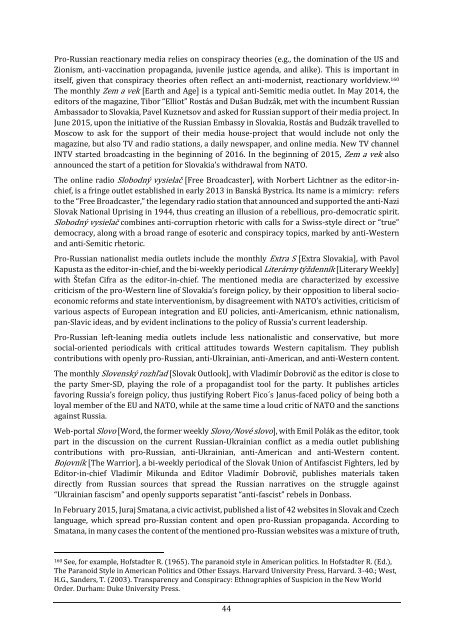to Central Europe
PC_reactionary_values_CEE_20160727
PC_reactionary_values_CEE_20160727
Create successful ePaper yourself
Turn your PDF publications into a flip-book with our unique Google optimized e-Paper software.
Pro-Russian reactionary media relies on conspiracy theories (e.g., the domination of the US and<br />
Zionism, anti-vaccination propaganda, juvenile justice agenda, and alike). This is important in<br />
itself, given that conspiracy theories often reflect an anti-modernist, reactionary worldview. 160<br />
The monthly Zem a vek [Earth and Age] is a typical anti-Semitic media outlet. In May 2014, the<br />
edi<strong>to</strong>rs of the magazine, Tibor “Elliot” Rostás and Dušan Budzák, met with the incumbent Russian<br />
Ambassador <strong>to</strong> Slovakia, Pavel Kuznetsov and asked for Russian support of their media project. In<br />
June 2015, upon the initiative of the Russian Embassy in Slovakia, Rostás and Budzák travelled <strong>to</strong><br />
Moscow <strong>to</strong> ask for the support of their media house-project that would include not only the<br />
magazine, but also TV and radio stations, a daily newspaper, and online media. New TV channel<br />
INTV started broadcasting in the beginning of 2016. In the beginning of 2015, Zem a vek also<br />
announced the start of a petition for Slovakia’s withdrawal from NATO.<br />
The online radio Slobodný vysielač [Free Broadcaster], with Norbert Lichtner as the edi<strong>to</strong>r-inchief,<br />
is a fringe outlet established in early 2013 in Banská Bystrica. Its name is a mimicry: refers<br />
<strong>to</strong> the “Free Broadcaster,” the legendary radio station that announced and supported the anti-Nazi<br />
Slovak National Uprising in 1944, thus creating an illusion of a rebellious, pro-democratic spirit.<br />
Slobodný vysielač combines anti-corruption rhe<strong>to</strong>ric with calls for a Swiss-style direct or “true”<br />
democracy, along with a broad range of esoteric and conspiracy <strong>to</strong>pics, marked by anti-Western<br />
and anti-Semitic rhe<strong>to</strong>ric.<br />
Pro-Russian nationalist media outlets include the monthly Extra S [Extra Slovakia], with Pavol<br />
Kapusta as the edi<strong>to</strong>r-in-chief, and the bi-weekly periodical Literárny týždenník [Literary Weekly]<br />
with Štefan Cifra as the edi<strong>to</strong>r-in-chief. The mentioned media are characterized by excessive<br />
criticism of the pro-Western line of Slovakia‘s foreign policy, by their opposition <strong>to</strong> liberal socioeconomic<br />
reforms and state interventionism, by disagreement with NATO’s activities, criticism of<br />
various aspects of <strong>Europe</strong>an integration and EU policies, anti-Americanism, ethnic nationalism,<br />
pan-Slavic ideas, and by evident inclinations <strong>to</strong> the policy of Russia’s current leadership.<br />
Pro-Russian left-leaning media outlets include less nationalistic and conservative, but more<br />
social-oriented periodicals with critical attitudes <strong>to</strong>wards Western capitalism. They publish<br />
contributions with openly pro-Russian, anti-Ukrainian, anti-American, and anti-Western content.<br />
The monthly Slovenský rozhľad [Slovak Outlook], with Vladimír Dobrovič as the edi<strong>to</strong>r is close <strong>to</strong><br />
the party Smer-SD, playing the role of a propagandist <strong>to</strong>ol for the party. It publishes articles<br />
favoring Russia’s foreign policy, thus justifying Robert Fico´s Janus-faced policy of being both a<br />
loyal member of the EU and NATO, while at the same time a loud critic of NATO and the sanctions<br />
against Russia.<br />
Web-portal Slovo [Word, the former weekly Slovo/Nové slovo], with Emil Polák as the edi<strong>to</strong>r, <strong>to</strong>ok<br />
part in the discussion on the current Russian-Ukrainian conflict as a media outlet publishing<br />
contributions with pro-Russian, anti-Ukrainian, anti-American and anti-Western content.<br />
Bojovník [The Warrior], a bi-weekly periodical of the Slovak Union of Antifascist Fighters, led by<br />
Edi<strong>to</strong>r-in-chief Vladimír Mikunda and Edi<strong>to</strong>r Vladimír Dobrovič, publishes materials taken<br />
directly from Russian sources that spread the Russian narratives on the struggle against<br />
“Ukrainian fascism” and openly supports separatist “anti-fascist” rebels in Donbass.<br />
In February 2015, Juraj Smatana, a civic activist, published a list of 42 websites in Slovak and Czech<br />
language, which spread pro-Russian content and open pro-Russian propaganda. According <strong>to</strong><br />
Smatana, in many cases the content of the mentioned pro-Russian websites was a mixture of truth,<br />
160 See, for example, Hofstadter R. (1965). The paranoid style in American politics. In Hofstadter R. (Ed.),<br />
The Paranoid Style in American Politics and Other Essays. Harvard University Press, Harvard. 3-40.; West,<br />
H.G., Sanders, T. (2003). Transparency and Conspiracy: Ethnographies of Suspicion in the New World<br />
Order. Durham: Duke University Press.<br />
44


